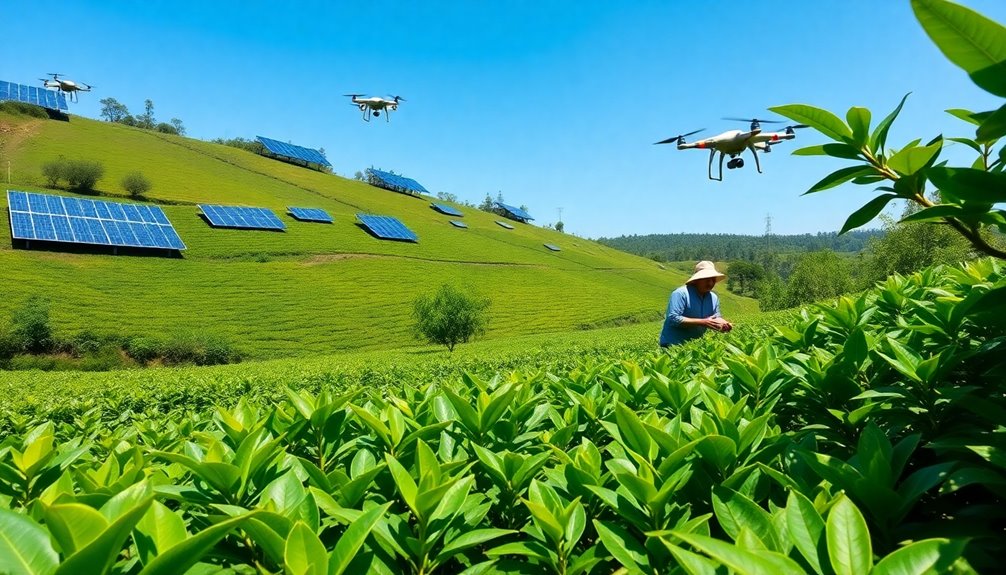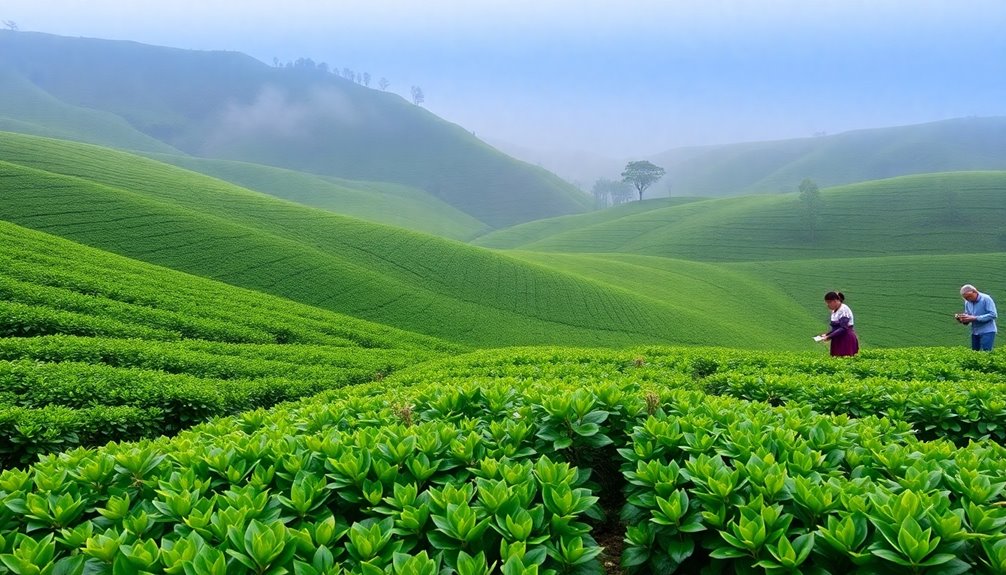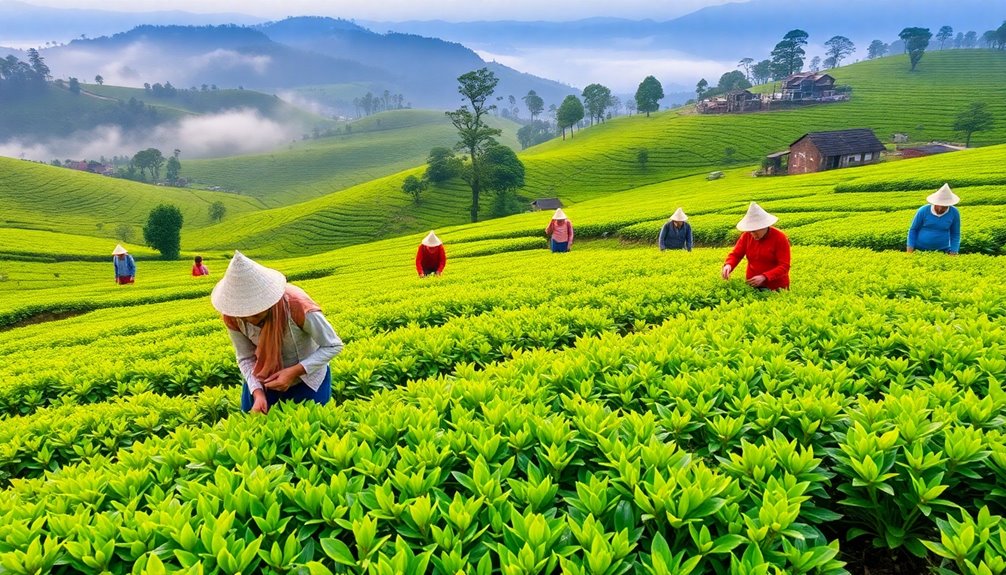Organic farming is reshaping tea production by focusing on healthier soil and more friendly ecosystems. By using natural methods instead of chemicals, growers help the soil thrive, leading to better plant growth. This kind of farming also invites more insects and wildlife, creating a balanced environment that supports life. Plus, organic farmers often earn more money for their tea, thanks to rising demand for eco-friendly products. While there are challenges in becoming certified, the benefits can be huge! Curious about how this impacts tea flavors and market trends? There's so much more to discover!
Key Takeaways
- Organic farming enhances soil health, leading to increased organic carbon and nitrogen content, which supports better tea plant growth.
- The avoidance of synthetic chemicals in organic tea farming boosts biodiversity, attracting beneficial insects and supporting ecosystem resilience.
- Long-term nitrogen cycling in organic practices improves soil fertility, ensuring sustainable tea production and reducing the risk of nutrient deficiencies.
- Organic tea can command price premiums of 25% to 50%, making it financially attractive for farmers despite initial transition challenges.
- Increased consumer demand for eco-friendly products drives market growth, with organic tea projected to grow at a CAGR of 5.2% through 2026.
Introduction

Organic farming isn't just a trend; it's a transformative approach to agriculture that prioritizes our planet's health. When it comes to organic tea farming, this means growing tea without using synthetic fertilizers, pesticides, or GMOs. Instead, farmers use sustainable practices that boost ecosystem health and promote biodiversity.
You might be surprised to learn that the global organic farming sector is growing fast, with a projected increase of 8.04% every year!
One reason for this growth is rising consumer demand for healthy, eco-friendly products. Plus, organic tea farmers often enjoy higher price premiums, which can be 25% to 50% more than conventional prices. This extra income helps farmers and their communities thrive.
However, it's not all smooth sailing. Organic tea farming can lead to lower yields and higher certification costs, which can be tough for transitioning farmers.
Despite these challenges, the environmental impact of organic tea is significantly better. Its eco-toxicity and effects on local species loss are much lower compared to conventional tea farms.
Organic Tea Farming's Soil Health
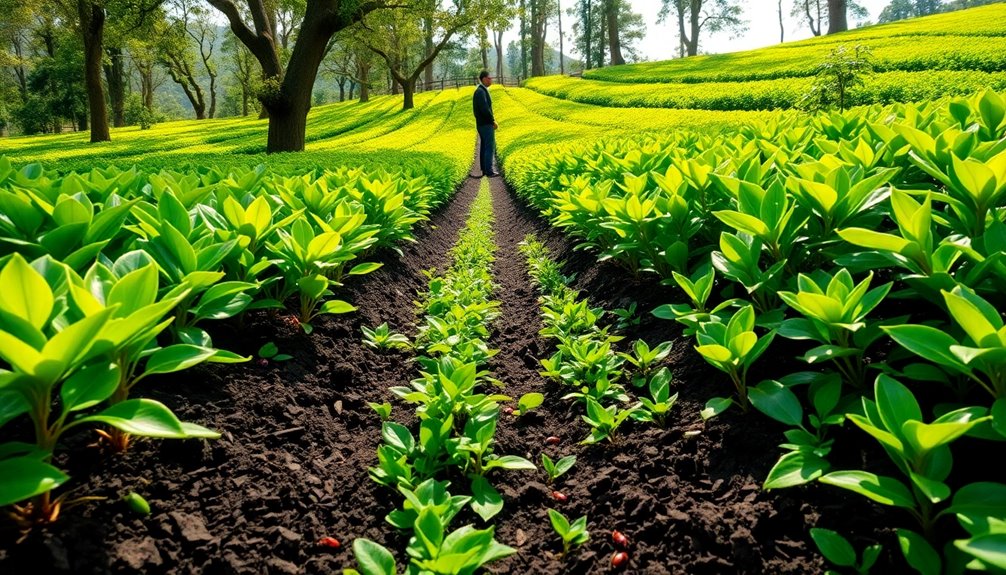
Over time, the benefits of organic tea farming on soil health become increasingly evident. When you look at organic gardens, you'll notice they've a higher soil organic carbon content—37.18 g/kg compared to just 26.52 g/kg in conventional farms. This means the soil in organic tea gardens is richer and healthier!
You'll also find that the nitrogen content is greater in organic gardens, with 2.97 g/kg versus 2.16 g/kg in conventional ones. This extra nitrogen helps the plants grow better.
Plus, the soil pH in organic tea farming averages around 5.32, which is more favorable for nutrient absorption compared to the lower 4.92 in conventional practices.
Using organic fertilizers and practicing biological nitrogen fixation are crucial for improving soil structure and fertility. However, it's important to manage these practices carefully over time to maintain soil health.
When you embrace organic practices, you're not just growing tea; you're also nurturing the ecosystem's health. So, every cup of organic tea you enjoy supports healthier soil and a happier planet! Isn't that amazing?
Higher Biodiversity in Organic Farms
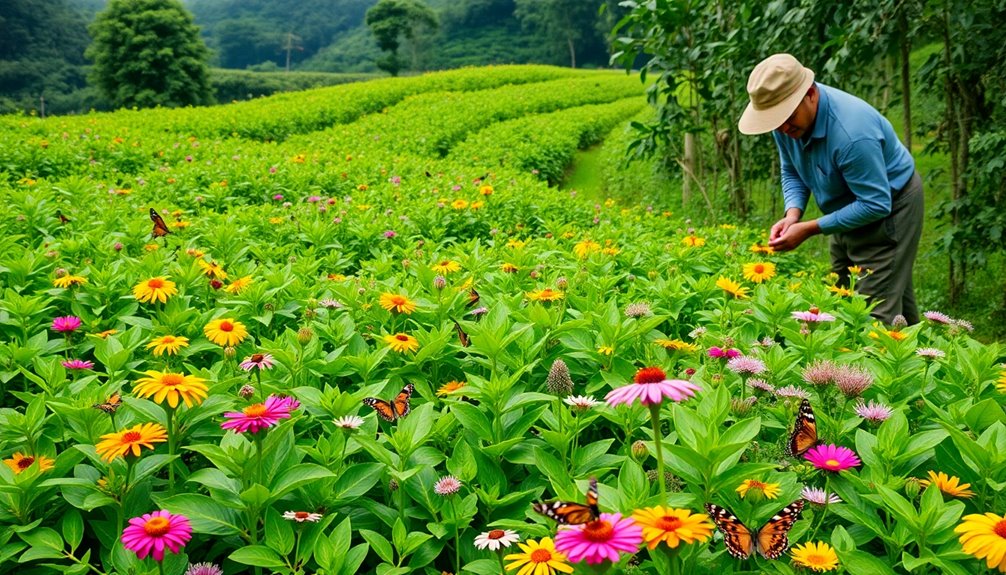
A thriving ecosystem is one of the standout benefits of organic tea farming, as it encourages higher biodiversity. When farmers choose organic practices, they avoid using synthetic pesticides and fertilizers. This decision creates a welcoming environment for a wide range of plant and animal species.
You'll find that organic tea farms attract beneficial insects, like pollinators, which play a key role in keeping ecosystems healthy. The diverse plants in these farms also enhance habitat availability for native wildlife. This means you might spot rare species, such as wild bison or beautiful orchids, thriving in their natural homes.
With improved ecological balance, these farms support a variety of life. Moreover, organic farming methods promote soil health. Healthy soil is home to diverse microbial communities that are essential for nutrient cycling. This resilience helps the entire ecosystem flourish.
Long-Term Nitrogen Cycling Benefits
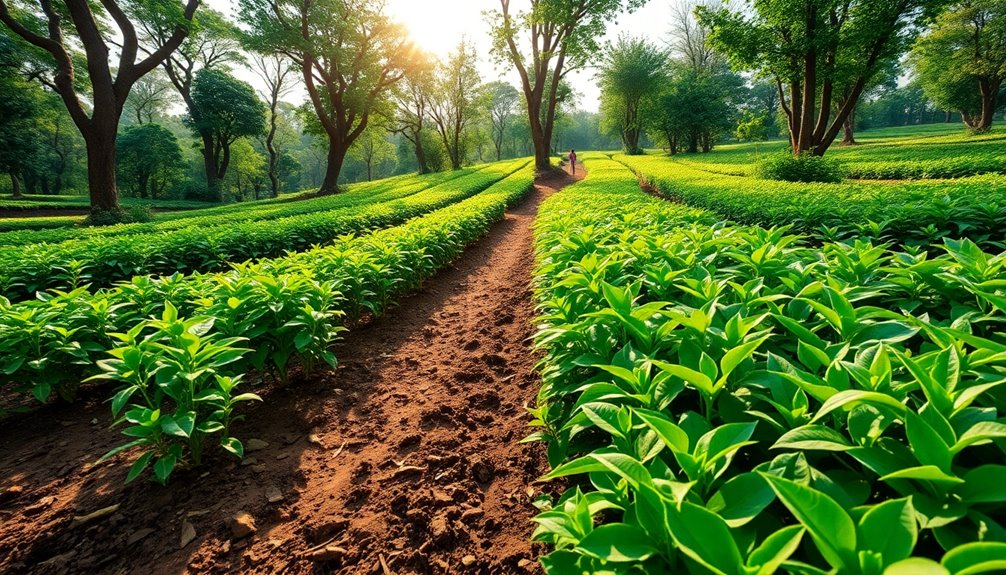
The benefits of long-term nitrogen cycling in tea farming are significant, particularly when you consider its impact on soil health. When you practice organic tea cultivation, you help create a vibrant soil environment. This means the soil can hold more nutrients, like nitrogen, which is crucial for healthy tea plants. In fact, organic gardens often have a higher average soil total nitrogen content of 2.97 g/kg, compared to 2.16 g/kg in conventional farms.
By using organic fertilizers and promoting biological nitrogen fixation, you can maintain strong nitrogen levels in the soil. This helps prevent nitrogen deficiencies, which can harm your crops.
Plus, organic farming boosts soil organic carbon levels, reaching 37.18 g/kg compared to just 26.52 g/kg in conventional gardens. This increase contributes to better soil health and fertility over time.
With higher soil organic matter and effective nitrogen cycling, you create a sustainable soil environment that supports long-term tea production. This means your tea plants can thrive for years to come, producing delicious leaves that everyone loves.
Embracing these practices not only benefits your crops but also the entire ecosystem!
Market Access for Organic Tea
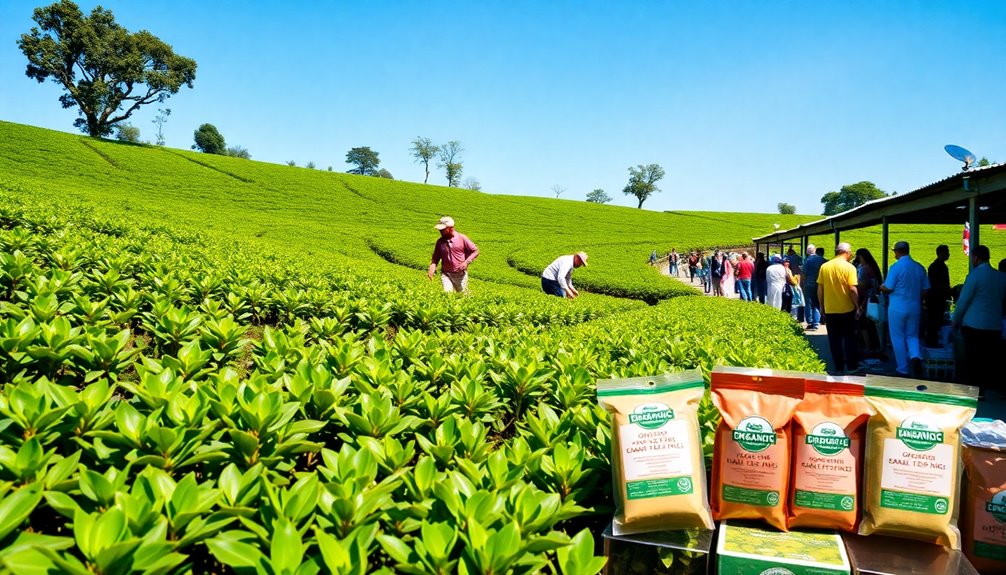
How can organic tea producers effectively navigate market access challenges?
First, it's important to understand that during the conversion period—when farmers are switching to organic methods—there's no "in conversion" label. This makes it tough for tea farmers to sell their products at competitive prices. Additionally, utilizing the power of imagination can help farmers innovate their approaches to marketing and production.
But don't lose hope! The potential price premiums for organic tea can be as much as 50% in developed countries. That's exciting!
To improve market access, you can focus on increasing consumer awareness and creating targeted marketing campaigns. People love organic products, and the more they know about the benefits, the more they'll want to buy! Engaging in meaningful storytelling about the benefits of organic farming can significantly enhance consumer connection.
Additionally, better resource management helps decrease input costs, making it easier for farmers to maintain their farms.
Forming cooperatives can also be a game changer. They connect tea farmers with buyers directly, which can boost sales and improve market access. Furthermore, as the organic tea market(https://www.example.com) is projected to grow at a CAGR of 5.2% through 2026, this presents a significant opportunity for producers.
Practical Applications
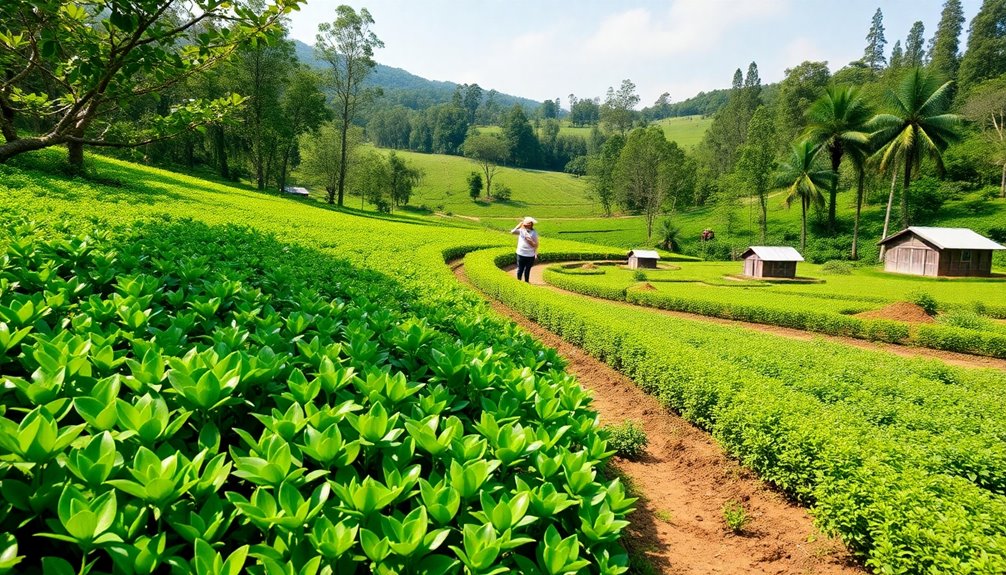
Many organic tea producers find that implementing practical applications can significantly enhance their farming practices and market presence. By using natural fertilizers and pest control methods, you can improve your soil health. This not only helps your tea plants but also supports biodiversity in your farming area. Furthermore, many herbal teas are known to contain antioxidants, which can combat oxidative stress and improve overall health. Additionally, incorporating essential oils for pest control can provide effective and natural alternatives to synthetic pesticides.
You might also consider methods like crop rotation and intercropping. These techniques boost soil nutrients and keep pesky bugs away, all without using synthetic chemicals.
Plus, when you switch to organic farming, you can earn price premiums. In developed markets, organic tea can cost 25% to 50% more than conventional tea, which is great news for your wallet!
Getting certified for organic tea can be a bit tricky and costly, but it's worth it. Certification builds trust with consumers, showing them that your products meet high organic standards.
With the global organic tea market growing at a fantastic rate of 8.04%, more people are looking for healthy and sustainable options. Additionally, adopting natural pest control methods can further enhance the sustainability of your farming practices and reduce reliance on synthetic chemicals.
Frequently Asked Questions
What Is Organic Tea Farming?
Organic tea farming focuses on using natural methods without synthetic fertilizers or pesticides. You promote ecosystem health, enhance soil quality, and cater to health-conscious consumers, ultimately leading to better incomes and sustainable practices in your community.
How Can We Improve Tea Production?
To improve tea production, you can enhance soil health with organic fertilizers, implement natural pest management strategies, invest in drought-resistant varieties, and educate consumers about organic benefits to boost demand and profitability.
Does Tea Need to Be Organic?
You might wonder if tea needs to be organic. By choosing organic, you're supporting healthier ecosystems, reducing chemical residues, and enjoying potentially better flavors, all while contributing to a more sustainable future for tea production.
Is Organic Tea Free of Pesticides?
Yes, organic tea's free of synthetic pesticides. It uses natural alternatives and strict regulations, ensuring you enjoy a healthier product. You'll appreciate that it supports beneficial insects and minimizes chemical residues in your tea.
Conclusion
In conclusion, organic farming is changing the way we grow tea, and that's exciting! By focusing on healthy soil and more plants, we help nature thrive. Plus, organic tea opens up new markets, giving farmers a chance to shine. When you sip your next cup of tea, remember the hard work and care behind it. Enjoy the rich flavors and feel good knowing you're supporting a healthier planet. Cheers to delicious organic tea and a brighter future!



